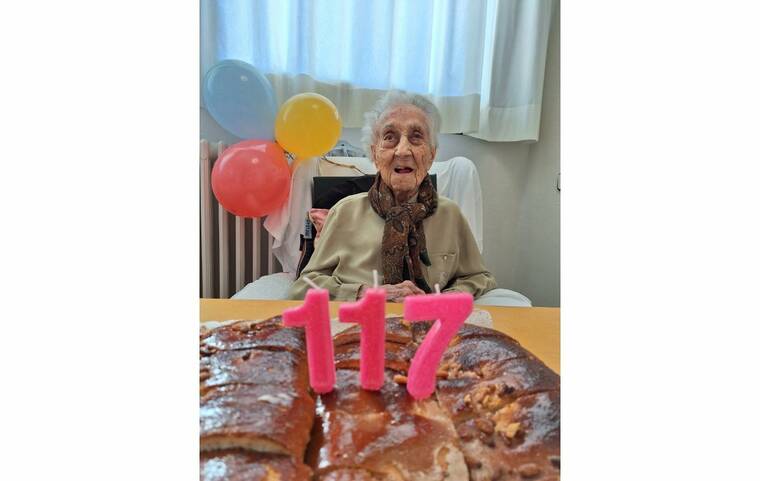Maria Branyas Morera, world’s oldest person, dies at 117

RESIDENCIA SANTA MARIA DEL TURA DE OLOT/HANDOUT VIA REUTERS
The world’s oldest woman at the time, Maria Branyas, poses in front of a birthday cake as she celebrates her 117th birthday in a nursing home, in Girona, Spain, on March 4.
Maria Branyas Morera, an American-born Spanish woman believed to be the oldest person in the world, has died, according to her family. She was 117.
Morera died on Monday in Olot, Spain, according to an employee at her nursing home, Residencia Santa Maria del Tura. Her family wrote in a post on her X social media account that she had died peacefully, in her sleep.
“A few days ago she told us: ‘One day I will leave here. I will not try coffee again, nor eat yogurt, nor pet my dog’” her family wrote in Spanish in the post. “‘I will also leave my memories, my reflections and I will cease to exist in this body. One day I don’t know, but it’s very close, this long journey will be over.’”
Born March 4, 1907, in San Francisco, Morera grew up in several American cities, including New Orleans, where her father, a journalist, started a Spanish-language magazine that went bankrupt, according to several news stories written about her life.
Facing dire straits, the family returned to Spain when Morera was a child. On the boat to Spain, her father died of tuberculosis.
There, she lived through the country’s civil war and the brutal regime of Francisco Franco. She had clear memories of the D-Day invasion at Normandy, she told Spanish newspaper La Vanguardia.
Don't miss out on what's happening!
Stay in touch with breaking news, as it happens, conveniently in your email inbox. It's FREE!
“I haven’t done anything special to get to this age,” she said in an interview with Spanish newspaper El País earlier this year.
But Manel Esteller, chair of genetics at the University of Barcelona and one of the researchers who would study the reasons for Morera’s long life, would disagree. Besides Morera’s genetic makeup and her lifestyle of no smoking and moderate exercise, Esteller said she was a survivor of war and hardships, which he thinks helped her live longer.
“It is thought that people that have survived struggle, they have an advantage,” he said.
Morera went on to marry a doctor, with whom she lived in Girona, Spain, for 40 years. The couple had three children, and Morera stayed home to raise them.
“She had a quiet life, without work stress,” her daughter, Rose, told El País.
In later years, Morera enjoyed more than a dozen grandchildren. She survived a bout with COVID, as well as the general anxiety and isolation of the pandemic — a feat she found easier, she said at the time, because she remembered a world without the modern-day comforts to which most people had become accustomed.
“We lost an endearing woman, who has taught us the value of life and the wisdom of the years,” Salvador Illa, president of the Catalan regional government, said in a post on X.
Morera became the oldest living person in January 2023, after the death of Lucile Randon, a French nun known as Sister André. According to the Gerontology Research Group, which tracks the world’s supercentenarians, the next-oldest living person after Morera is Tomiko Itooka of Japan, who is 116 years old.
Morera is survived by her two daughters, who are 91 and 82, and many grandchildren.
Reaching 117 comes with a toll. Morera suffered hearing and vision loss, and struggled to move freely in recent years. Still, she had no indication of cancer, heart disease or other mortal illnesses. She also never showed signs of dementia.
Having been born before the emergence of the telephone, Morera came to embrace the digital revolution, fashioning herself on social media as “Super Àvia Catalana,” or “Super Catalan Grandma.” From there, she posted bite-size pieces of life advice, observations and jokes to thousands of followers.
In her biography on X, she wrote: “I’m old, very old, but not an idiot.”
Since becoming the oldest living person, she had to manage a torrent of media interest, playfully stymying the reporters who lined up outside her nursing home for interviews. The attention eventually became too much, and her family stopped allowing visitors.
Like many supercentenarians, Morera became the subject of scientific fascination. Her habits and lifestyle — and genetic makeup — have been studied in the hopes of understanding her longevity.
Like many supercentenarians, Morera became the subject of scientific fascination. Esteller found her genes were protective against DNA damage, and she had low levels of fat and sugar in her blood, all of which he said was helpful for living a long life. His research also found that her cells aged much slower than she did, meaning she had a lower “biological age” than her actual age.
The Catalan diet, which is similar to the Mediterranean diet and includes a lot of olive oil, has also been linked to longer survival, he said, adding that Morera liked to eat yogurt.
“What do you expect from life?” a doctor once asked her while retrieving blood samples for study, according to El País.
Morera, unmoved, answered simply: “death.”
This article originally appeared in The New York Times.
© 2024 The New York Times Company



